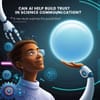Artificial intelligence is making waves across industries, and science communication is no exception. A recent study delves into how AI could play a pivotal role in bridging the gap between scientists and the public by enhancing trust in science. With misinformation and skepticism on the rise, researchers are investigating whether AI-powered tools can reshape how scientific information is shared and perceived.
The Trust Issue in Science Communication
In today’s fast-paced information age, public trust in science faces challenges from misinformation, sensationalism, and polarized opinions. Despite scientists' efforts to communicate effectively, complex jargon and accessibility barriers often hinder their message. This gap has led to misunderstandings and growing skepticism, particularly on topics like climate change and public health.
The study examines whether AI can help overcome these hurdles by presenting scientific findings in a clear, engaging, and unbiased manner. By leveraging advanced algorithms, AI has the potential to act as a neutral bridge, simplifying complex ideas without sacrificing accuracy.
How AI Enhances Science Messaging
AI-powered tools, such as natural language processing (NLP) systems, can analyze vast datasets and distill them into concise, easy-to-understand formats. These tools can generate explanatory text, create engaging visuals, and even tailor messages to specific audiences based on their preferences and level of understanding.
Additionally, AI can detect and flag misinformation, helping scientists and communicators ensure the accuracy of their messages. This capability could be especially valuable in social media, where misinformation spreads quickly.
Building Empathy and Accessibility
One of the study's key findings is that AI can play a significant role in creating content that resonates emotionally with audiences. By analyzing language patterns and user feedback, AI can craft messages that foster empathy and connection, making science more relatable and less intimidating.
For example, AI tools could help translate scientific studies into stories or narratives that highlight their real-world impact. This approach makes the information more engaging and accessible, particularly for non-specialist audiences.
Challenges and Ethical Considerations
While AI holds great promise, its use in science communication is not without challenges. Concerns about biases in AI algorithms, potential oversimplification of complex topics, and over-reliance on technology must be addressed. Ensuring transparency and maintaining a human touch in communication remain critical for building genuine trust.
The ethical implications of using AI to shape public opinion also require careful consideration. Scientists and communicators must strike a balance between leveraging AI’s capabilities and preserving the authenticity and integrity of their messages.
A Step Toward Greater Trust
As science continues to play a critical role in addressing global challenges, building public trust in scientific communication has never been more important. This study highlights AI’s potential as a powerful ally in making science more transparent, accessible, and engaging.
By embracing AI thoughtfully and responsibly, scientists and communicators can pave the way for a more informed and trusting society—where scientific knowledge truly empowers rather than divides.


